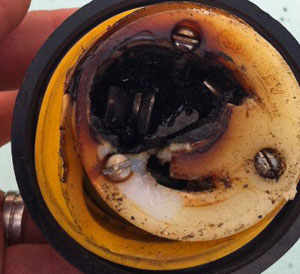Is Your Shore Power Cord Melting?
As part of my informal spring getting ready checklist I'd be remiss if I didn't mention your boat's shore power cord. You need to check to see if it is melting......... What I mean by that is taking a close look at all of the insulation on the length of the cord to ensure that the insulation hasn't been cut or abraded to the point where the individual wires inside the outer insulating jacket are exposed, but also to check for any sign of terminal over-heating at both the boat end and dock box end of the cord. Is there any sign of melting insulation? The photo below shoes what this will look like: Unfortunately the cause for what you see in the photo above may actually be in your dock box. As I've mentioned before and will probably mention again sometime, the primary by-product of electrical resistance is heat. Electrical resistance can be caused by loose electrical connections, in this case your shore power cord. At the dock end, most often the cause is at the receptical in the pedestal. the terminals loosen up after years of a plug being pushed in and out of the socket, resistance develops and heat is generated, causing melting around the actual connecting lugs or pins. At the boat end, the same thing is true and the melting you see above is the net result. Left unattended, these connections can generate enough heat to actually start a fire. Circuit breakers will not trip in this case because the actual amperage flow is being resitricted, and amps are what trip circuit breakers, less amps means no trip! So, what happens is these things just keep getting progressively hotter to a point of ignition someday. Before you launch this year, check that cord, if its starting to melt, you may be able to repair the ends with replacement parts, if the insulating jacket is violated, its time for a new cord. Take a really close look at the reseptical on your dock box, and if you have any suspicions about it, get you marina to inspect it and make any needed repairs. Check yours today and be sure you're safe for the upcoming season!
As part of my informal spring getting ready checklist I'd be remiss if I didn't mention your boat's shore power cord. You need to check to see if it is melting......... What I mean by that is taking a close look at all of the insulation on the length of the cord to ensure that the insulation hasn't been cut or abraded to the point where the individual wires inside the outer insulating jacket are exposed, but also to check for any sign of terminal over-heating at both the boat end and dock box end of the cord. Is there any sign of melting insulation? The photo below shoes what this will look like:

Unfortunately the cause for what you see in the photo above may actually be in your dock box. As I've mentioned before and will probably mention again sometime, the primary by-product of electrical resistance is heat. Electrical resistance can be caused by loose electrical connections, in this case your shore power cord. At the dock end, most often the cause is at the receptical in the pedestal. the terminals loosen up after years of a plug being pushed in and out of the socket, resistance develops and heat is generated, causing melting around the actual connecting lugs or pins. At the boat end, the same thing is true and the melting you see above is the net result. Left unattended, these connections can generate enough heat to actually start a fire. Circuit breakers will not trip in this case because the actual amperage flow is being resitricted, and amps are what trip circuit breakers, less amps means no trip! So, what happens is these things just keep getting progressively hotter to a point of ignition someday. Before you launch this year, check that cord, if its starting to melt, you may be able to repair the ends with replacement parts, if the insulating jacket is violated, its time for a new cord. Take a really close look at the reseptical on your dock box, and if you have any suspicions about it, get you marina to inspect it and make any needed repairs. Check yours today and be sure you're safe for the upcoming season!












